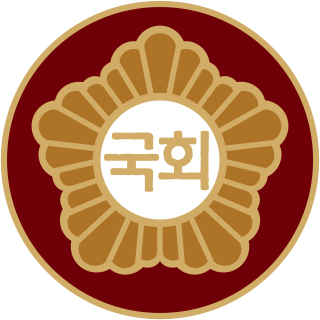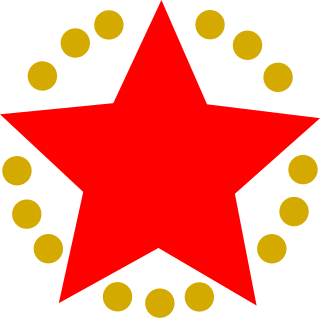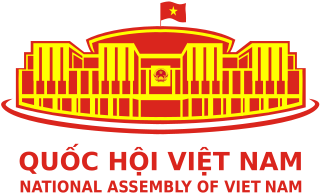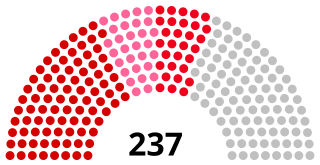
The history of South Korea begins with the Japanese surrender on 2 September 1945. At that time,South Korea and North Korea were divided,despite being the same people and on the same peninsula. In 1950,the Korean War broke out. North Korea overran South Korea until US-led UN forces intervened. At the end of the war in 1953,the border between South and North remained largely similar. Tensions between the two sides continued. South Korea alternated between dictatorship and liberal democracy. It underwent substantial economic development.
An electoral college is a body whose task is to elect a candidate to a particular office. It is mostly used in the political context for a constitutional body that appoints the head of state or government,and sometimes the upper parliamentary chamber,in a democracy. Its members,called electors,are either elected by the people for this purpose or by certain subregional entities or social organizations.

The president of the Republic of Korea,also known as the president of Korea,is both the head of state and head of government of the Republic of Korea. The president is directly elected by the citizens of the Republic of Korea and pledges to execute the duties of their office,chief among others "to defend the State,pursue peaceful unification of the homeland." The president leads the State Council,is the chief of the executive branch of the national government and the commander-in-chief of the Republic of Korea Armed Forces.

The National Assembly was the authoritative legislative body of the Republic of China,from 1947 to 2005. Along with the Control Yuan and the Legislative Yuan,the National Assembly formed the tricameral parliament of the Republic of China.

The National Assembly of the Republic of Korea is the unicameral national legislature of South Korea. Elections to the National Assembly are held every four years. The latest legislative elections were held on 10 April 2024. The current National Assembly held its first meeting,and also began its current four year term,on 30 May 2024. The current Speaker was elected 5 June 2024. The National Assembly has 300 seats,with 253 constituency seats and 47 proportional representation seats;30 of the PR seats are assigned an additional member system,while 17 PR seats use the parallel voting method.

The Supreme People's Assembly is the legislature of North Korea. It is ostensibly the highest organ of state power and the only branch of government in North Korea,with all state organs subservient to it under the principle of unified power. However,in practice it is a rubber stamp legislature which exists to approve decisions made by the ruling party as a formality,and which has little to no real power of its own.

The Korean Social Democratic Party (KSDP) is a political party in North Korea that is allied with the ruling Workers' Party of Korea (WPK). It was formed on 3 November 1945 as the Korean Democratic Party by a mixed group of entrepreneurs,merchants,handicraftsmen,petite bourgeoisie,peasants,and Christians. The party's founders were motivated by anti-imperialist and anti-feudal aspirations,and aimed to eliminate the legacy of Japanese rule and build a new democratic society. The party came under greater influence of the ruling government over time,and today is under the effective control of the WPK.

Elections in North Korea are held every four-to-five years for the Supreme People's Assembly (SPA),the country's national legislature,and every four years for Local People's Assemblies. Each candidate is preselected by the North Korean government and there is no option to write in other candidates,meaning that voters may either submit the ballot unaltered as a "yes" vote or request a pen to cross out the name on the ballot. Critics argue that North Korean elections are show elections which lack competition and allow the government to claim a veneer of pseudo-democratic legitimacy. A person's vote is not kept anonymous,and those who cross off the name on a ballot are often subject to legal and professional consequences. According to official reports,turnout is near 100%.

Constituent Assembly of India was partly elected and partly nominated body to frame the Constitution of India. It was elected by the Provincial assemblies of British India following the Provincial Assembly elections held in 1946 and nominated by princely states. After India's independence from the British in August 1947,its members served as the nation's 'Provisional Parliament',as well as the Constituent Assembly. It was conceived and created by V. K. Krishna Menon,who first outlined its necessity in 1933 and enshrined it as an Indian National Congress demand.

Constitutional Assembly elections were held in South Korea on 10 May 1948. They were held under the U.S. military occupation,with supervision from the United Nations,and resulted in a victory for the National Association for the Rapid Realisation of Korean Independence,which won 55 of the 200 seats,although 85 were held by independents. Voter turnout was 95%.

The Third Republic of Korea was the government of South Korea from December 1963 to November 1972. The Third Republic was founded on the dissolution of the Supreme Council for National Reconstruction that overthrew the Second Republic and established a military government in May 1961. Park Chung Hee,the Chairman of the Supreme Council,was elected President of South Korea in the 1963 presidential election.

The National Assembly of the Socialist Republic of Vietnam is the unicameral parliament and the highest body of state power of Vietnam. The National Assembly is the only branch of government in Vietnam and,in accordance with the principle of unified power,all state organs are subservient to it.

The Socialist Constitution of the Democratic People's Republic of Korea is the constitution of North Korea. It was approved by the 6th Supreme People's Assembly at its first session on 27 December 1972,and has been amended and supplemented in 1998,2009,2012,2013,2016,2019 (twice),2023 and 2024. It replaced the country's first constitution which was approved in 1948.

The President of the State Affairs Commission of the Democratic People's Republic of Korea,alternatively styled "President of State Affairs" in official translations,is the supreme leader and head of state of North Korea. The president chairs the State Affairs Commission (SAC),which is the highest leadership institution in North Korea,and serves as the commander-in-chief of the North Korean armed forces.

Yi Yun-young was an independence activist,educator,and Methodist minister during the Japanese occupation of Korea. His family clan originated in Danyang,and he was from Yongbyon in Pyonganbuk-do. His art name was Baeksa. During the March 1st Independence Movement,he was arrested for holding a lecture declaring independence and protesting against the Japanese occupation. In 1940,his pastoral qualifications were suspended because he opposed the unification of the churches in Korea and Japan and refused to adapt Sōshi-kaimei. After the Liberation,he participated with Cho Man-sik in the Committee for the Preparation of Korean Independence,founded the Korean Democratic Party,and was active as the party's vice leader. After his escape to the South,he was recommended as acting prime minister. After the establishment of Korea's government,he was named to be the first prime minister,but he was defeated because of the rejection of his confirmation by the Korea Democratic Party. After that,he was named to be the prime minister three more times,but each time he was rejected. Being one of Syngman Rhee's closest allies,he served as Minister without Portfolio and Minister of Social Affairs during the First Republic. He ran for vice president representing the anti-Lee Ki-poong faction but was defeated. After the May 16th Coup,he was Chairman of the Committee for Struggle against the prolongation of Military Government and executive member of the People's Party. He was an aide of Cho Man-sik,then after he defected to the South,he worked as an aide to Syngman Rhee.

Legislative elections were held in South Korea on 13 April 2016. All 300 members of the National Assembly were elected,253 from first-past-the-post constituencies and 47 from proportional party lists. The election was an upset victory for the liberal Democratic Party,which defied opinion polling by winning a plurality of seats in the election and defeating the ruling conservative Saenuri Party by one seat. In votes for party lists,however,Democratic Party came third,behind the Saenuri Party in first place and the new People Party in second.

The People's Assembly of North Korea (Korean: 북조선인민회의) was the unicameral legislature of the People's Committee of North Korea. It consisted of 237 deputies elected during a meeting of the provincial,city and county people's committees,political parties and social organizations of North Korea held from 17 to 20 February 1947.

Paek Nam-un was an economist,educator and politician during the Japanese colonial period and following the establishment of the Democratic People's Republic of Korea. He was a professor of economics at Yeonhee College and an economic theorist of the Communist Party of Korea,and a representative figure of socialist economists during the Japanese colonial period along with Lee Soon-Tak. After the independence,on the premise of some asset class and solidarity,in the article 'The Path of the Chosun People's','Combination of New Democracy ' was proposed. After liberation,Kim Doo-bong,Heo Jeong-suk,and Choi Chang-ik connected with Nam Joseon New Democratic Party and Nationalist Democratic Front,but did not come down after coming to North Korea with Kim Gu,Kim Kyu-sik,Jang Geon-sang in April 1948. Since then,he served as the first literary statue of the Democratic People's Republic of Korea and the chairman of the Supreme People's Assembly.

















